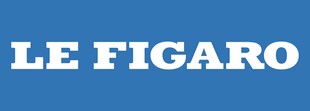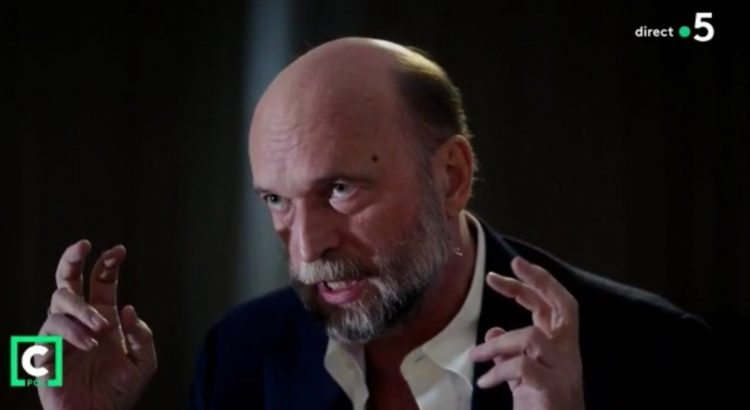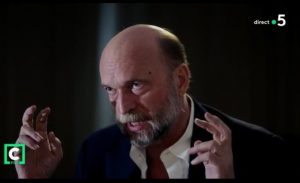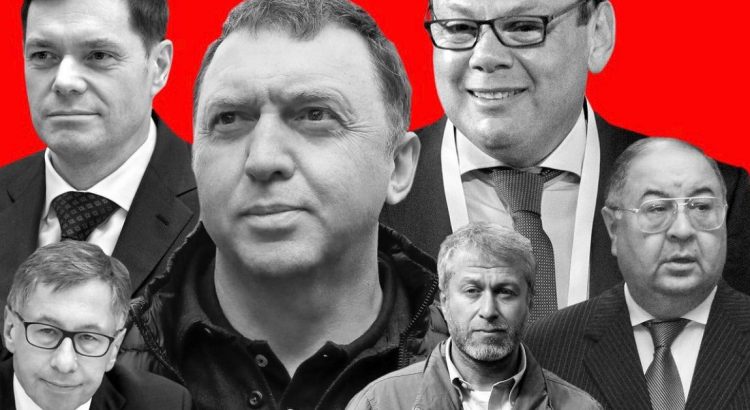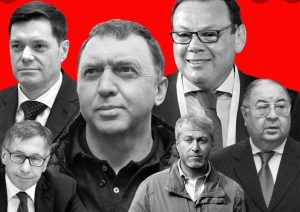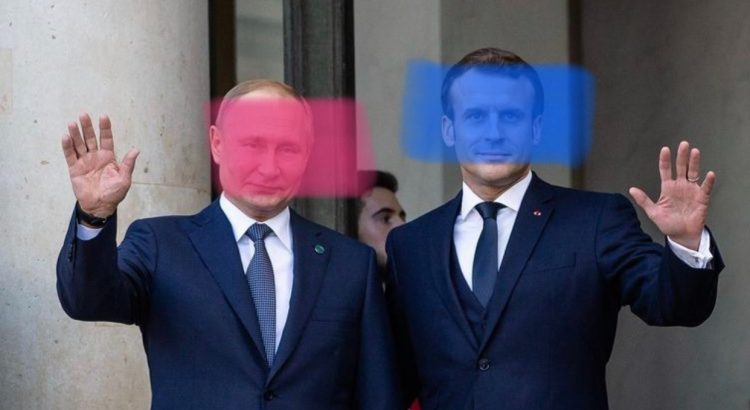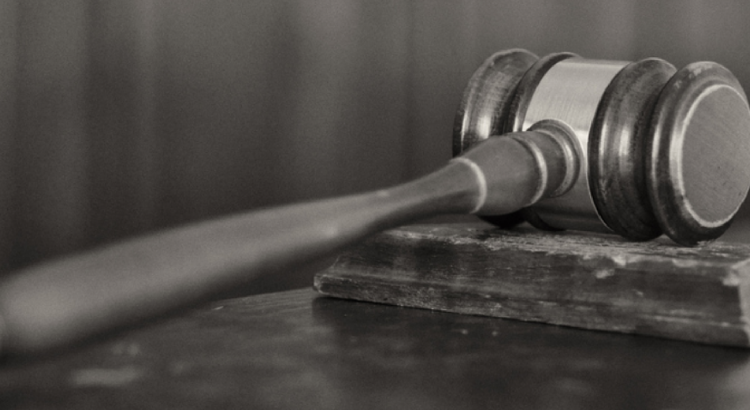Navires français Mistral : révélations sur la corruption du système Poutine
Dans le deuxième volet d’un entretien au long cours, l’oligarque Sergueï Pougatchev affirme qu’un proche de Poutine, Sergueï Tchemezov, encaisse depuis vingt ans des commissions occultes sur des comptes offshore du président russe en lien avec des marchés d’armement. Le contrat des navires de guerre français Mistral, conclu par Nicolas Sarkozy et annulé par François Hollande, n’aurait pas dérogé à la règle.
C’était un contrat à haut risque, de l’aveu même de certains militaires français. Livrer des navires de guerre Mistral BPC (bâtiments de projection et de commandement) de 22 000 tonnes à la marine russe, au lendemain de l’invasion de la Géorgie en 2008, comme le voulait Nicolas Sarkozy, pouvait être un mauvais signal adressé à la Russie.
L’oligarque Sergueï Pougatchev, propriétaire de chantiers navals et premier négociateur de ce contrat de 1,5 milliard d’euros, signé en juin 2011, confirme aujourd’hui que la commande des Mistral répondait aux impératifs d’une nouvelle doctrine russe, visant, déjà, à pouvoir « projeter des troupes et des matériels » dans les pays limitrophes, tout en bénéficiant d’un transfert de technologies sensibles.
Pour Pougatchev, ce projet a eu pour corollaire la reprise par l’État puis l’expropriation pure et simple de ses chantiers navals à Saint-Pétersbourg, seuls capables de produire ces navires que la Russie espérait dupliquer en deux exemplaires supplémentaires au moins.
Mais ce marché militaire aurait eu aussi des arrière-plans financiers inavouables. Selon Sergueï Pougatchev, un proche de Vladimir Poutine, Sergueï Tchemezov, patron de Rosoboronexport, puis de la holding d’État Rostec (et qui n’est autre que son ancien supérieur au KGB, à Dresde), encaisse en effet depuis vingt ans des commissions sur les marchés d’armement sur des comptes offshore du président.
Sergeï Tchemezov et Vladimir Poutine à Moscou, le 8 mai 2017. © Photo Alexei Nikolsky / présidence russe / Tass / Abaca
« Personne d’autre en Russie n’avait le droit d’acheter ou de vendre [de l’armement], sauf à passer par Tchemezov, et en lui payant une commission de 8 % […] via des sociétés offshore », affirme aujourd’hui l’oligarque. Une pratique internationale évidemment interdite par la loi sur la corruption des agents publics étrangers.
Sergueï Tchemezov, qui a reçu la Légion d’honneur des mains de Nicolas Sarkozy, en mars 2010, aurait aussi, selon Pougatchev, négocié des commissions sur le contrat franco-russe des Mistral.
Contacté par Mediapart, via la direction de Rostec, Sergueï Tchemezov nous a adressé un démenti en ces termes : « Ces déclarations sont l’émanation d’une conscience compromise. C’est un “fake”, un mensonge délibéré qui s’inscrit dans le cadre d’une campagne de discrédit de la Russie. »
Les navires n’ont heureusement pas été livrés, à la suite de l’annexion de la Crimée en mars 2014, François Hollande ayant décidé d’annuler la vente en application de l’embargo – les Mistral ont finalement été revendus à l’Égypte, malgré l’instauration depuis le coup d’État militaire de 2013 de la dictature d’al-Sissi. Mais l’artisan du contrat, Nicolas Sarkozy, estimait encore, en novembre 2014, que la France devait « honorer sa parole » et « livrer les Mistral ». Second volet de l’entretien de Sergueï Pougatchev à Mediapart.
Vous avez été à l’origine du contrat d’achat des navires de guerre français Mistral par la Russie, avant d’en être écarté par Poutine en personne. D’où était venue l’idée d’acheter ces navires plus particulièrement ?
Sergueï Pougatchev : À l’époque, je possédais le plus gros complexe de construction navale de Russie. Le ministère de la défense a organisé des réunions, en présence du commandement de la flotte, pour nous faire savoir qu’il avait besoin de navires de débarquement capables de transporter beaucoup d’équipement et de forces pour pouvoir mener, comme dit Poutine, des « opérations spéciales ». La flotte russe n’avait pratiquement pas changé depuis l’époque soviétique. Elle était dans un état lamentable.
Lors des préparatifs de la guerre avec la Géorgie [en 2008 – ndlr], les militaires russes ont révisé leur doctrine. L’ennemi principal n’était plus les États-Unis mais les anciennes républiques soviétiques. Les bateaux qui avant croisaient en Atlantique, dans les mers du Nord, en Méditerranée ou ailleurs, n’étaient plus nécessaires.
Il leur fallait des bateaux pour patrouiller dans la zone des trois milles, pour surveiller les frontières, garder un œil sur les voisins. En cas d’opération en mer Baltique ou en mer Noire, ils voulaient pouvoir projeter des troupes et des matériels pour pouvoir assurer une opération terrestre. En Ukraine, vous pouvez acheminer par la route, par le rail, mais en Géorgie, ce n’est pas possible, donc il fallait être en capacité de débarquer des tanks, des véhicules de combat, des hommes.
Poutine me dit : “C’est super, tous ces milliards. Mais attention, tous ces milliards, tu les reçois de l’État.”
La Russie n’avait pas ce type de bateaux. Ils se sont donc tournés vers moi. Ils m’ont demandé si je pouvais en construire et combien. J’ai eu besoin d’étudier, de regarder ce qui se faisait ailleurs, qui étaient les leaders. D’où il est ressorti qu’il y avait les bateaux français, les Mistral donc, et les coréens. Il était exclu de voir du côté américain.
J’ai visité les chantiers navals français avec une délégation russe. Et les militaires ont donné leur accord, en 2009. La formulation de l’accord que j’ai signé était la suivante : deux BPC seraient construits en France, d’une valeur de 1,5 milliard, l’assemblage devait s’achever en Russie, puis la France nous cédait sa licence pour en construire vingt au total, en Russie. Pour ma compagnie, c’était un contrat à 15 milliards d’euros – avec une rentabilité pour moi de l’ordre de 20 %. C’était le deal.
Donc vous étiez en pleins pourparlers lorsque Poutine s’est invité dans le deal…
Oui. D’abord, il s’est rendu sur place, en personne, à Saint-Pétersbourg, pour mener une conférence sur la construction navale, dans mon usine, l’OPK [Corporation industrielle unifiée – ndlr], sans m’y convier. « Usine » est une façon de parler parce qu’on parle d’un complexe gigantesque, sur une superficie équivalente à la moitié de Saint-Pétersbourg, avec des chemins de fer, des tunnels, une centrale électrique. Poutine est premier ministre. Mon PDG m’informe, me demande si je viens. Je lui explique que je n’ai pas été convié.
Lors de cette réunion, Poutine demande à mon directeur pourquoi nous n’avons aucune coopération avec les chantiers navals d’État – qui n’existaient que sur le papier. Il explique que ça ne va pas et il propose, en pleine conférence, de nommer à la tête du conseil d’administration des chantiers navals d’État le premier vice-premier ministre Igor Setchine. Lequel Setchine était présent lui aussi.
Je vois Poutine à son retour à Moscou. Il me dit : « C’est super, tous ces milliards. Mais attention, tous ces milliards, tu les reçois de l’État. » Ça sonnait comme un signal assez étrange. Son message était : « Moi, Poutine, je te paie pour ces bateaux. »
Il me dit : « J’ai mis Setchine [à la tête des chantiers d’État], il faut travailler avec lui », et insiste, sur le thème « il faut partager » : « Tu ne peux pas être le seul, il faut développer les chantiers d’État. Là, tu as le monopole, laisse faire un peu la concurrence. »
Après ça, Setchine écrit à mon directeur pour lui demander en urgence nos carnets de commandes, les montants et les délais de livraison, pour les exposer à Poutine.
C’était la première fois que Poutine manifestait son intérêt pour vos affaires ?
J’ai commencé à bâtir ce complexe de construction navale dans les années 1990, sous Elstine, alors que Poutine n’était pas encore au pouvoir.
Poutine savait que les principales sources de revenus pour la Russie sont le pétrole et le gaz, mais ce n’est qu’à l’approche de 2010 qu’il a compris que la construction navale était un enjeu énorme, gigantesque, pour l’exploitation du plateau arctique. Et que c’étaient non seulement des sommes colossales, chose qui l’a toujours intéressé, mais aussi un levier d’influence très sérieux sur Gazprom, Rosneft, Loukoïl et consorts, qui étaient tous mes clients, de même que des compagnies occidentales, sans oublier bien évidemment l’armée. J’étais alors le seul exportateur de navires militaires de surface en Inde, en Chine et dans d’autres pays. Donc, d’abord on parle de milliards, et ensuite d’une sphère qui, selon Poutine, devrait être une prérogative de l’État.
À l’approche de 2010, Poutine a compris que la construction navale était un enjeu énorme, gigantesque.
C’était un marché assez captif : quand j’ai créé OPK Naval, il fallait renouveler 75 % de la flotte russe. Il s’agit d’un marché de 100 milliards de dollars au bas mot. On n’avait pas le choix. On ne pouvait pas construire des bateaux de guerre en Allemagne ou aux États-Unis, c’est évident.
Poutine était présent, à chaque fois, lors de la mise à l’eau des navires, comme président ou comme premier ministre. Mais il se montrait souvent mécontent. J’ai construit le plus grand brise-glace à propulsion nucléaire au monde, pour le « 50e anniversaire de la Victoire ». On sort des brise-glace en série, chacun coûte entre 1,5 et 2 milliards de dollars – le premier est le plus grand au monde, tout le monde ne parle que de ça, et lui n’était pas content.
Je lui demandais : « Mais pourquoi tu n’es pas content ? »
Il me répondait : « Mais qu’est-ce qui te prend avec tous tes brise-glace ? »
C’était étrange.
Au moment de la négociation d’achat des Mistral, il vous a donc proposé de vous racheter l’entreprise…
Oui. Fin 2009, Poutine m’appelle et me dit : « Tu peux venir boire un thé, manger un morceau. » C’était dans sa datcha, à Novo-Ogarevo [sa résidence officielle – ndlr].
Il me dit : « Écoute, j’ai réfléchi. Tu as beaucoup de choses, l’immobilier, les chantiers navals, les mines. Ça fait trop, t’as pas le temps. Pourquoi tu t’embêtes avec les chantiers navals. C’est des sommes colossales, ces bateaux de guerre. Ça devrait appartenir à l’État. On est prêts à te racheter. Qu’en penses-tu ?
— Écoute, pourquoi pas. La question, c’est combien. Sur le principe, pourquoi pas, tout se vend, sauf la conscience et l’honneur. Je t’écoute. »
Normalement, un rachat de ce type, c’est d’abord une demande d’estimation, sur trois mois.
Poutine me dit : « T’en veux combien ? »
Je lui réponds : « Volodia [diminutif de Vladimir – ndlr], qu’est-ce que j’en sais ? J’ai besoin d’une évaluation précise. Il faut attendre quelques mois que Ernst & Young et compagnie fassent leur travail. Je peux pas te donner un chiffre. »
Il insiste : « Combien tu en veux ? »
Je lui dis : « C’est pas la question, laisse-moi au moins un mois pour te donner l’évaluation précise des actifs.
— OK, un mois, mais toi, toi tu penses que ça vaut combien ? T’as bien une idée ! »
Je réponds : « Dans les 10 milliards de dollars. »
Il me dit : « Avec la crise de 2008, l’inflation, tout ça, 10, c’est beaucoup.
— Tu me demandes, je te réponds 10 milliards minimum. »
Il me dit : « On va s’entendre. 7,5, ça te va ? »
Je lui dis : « Je m’en fiche, je veux juste que ce soit by the book. Si ça se trouve, on est en dessous.
— Arrête de me prendre la tête… C’est mieux si toi et moi on se met d’accord maintenant, plutôt que de te retrouver en conflit avec Setchine. » Il me dit ça. C’était évidemment une menace.
Je comprends et lui dis alors : « 7,5, ça ira. »
Il me dit : « Tu vois, c’est pas si compliqué de s’entendre », et il appelle Koudrine, le ministre des finances. Il lui dit : « Alexeï Leonidovitch, je suis avec Sergueï Viktorovitch, il veut vendre ses chantiers navals. Il faut trouver l’argent rapidement. On s’est mis d’accord sur 7,5 milliards de dollars. »
Koudrine lui explique que c’est l’argent du budget, qu’on est en fin d’année, qu’il faut mettre ça sur le prochain budget, donc pas avant septembre 2010. Poutine le presse. Mais Koudrine le prévient qu’il aura du mal à trouver 7,5 milliards. Peut-être pourra-t-il en trouver 5 au maximum. Poutine dit : « OK pour 5 tout de suite et le reste, on verra plus tard. ».Il me demande si ça me va. Je lui dis : « OK. »
On finit de dîner, on parle d’autres choses. Le lendemain, je vois Koudrine, qui me dit : « Le chef a perdu la tête ou quoi ? Où tu veux que je trouve l’argent ? »
Cela va durer quelque temps. Les conflits et les intrigues se multiplient, le rachat s’enlise et finit en raid d’expropriation.
[Le 21 mars 2011, selon des documents que Mediapart a pu consulter, le sort s’accélère : une réunion gouvernementale conviée à examiner le financement de la nationalisation d’OPK démarre sur les possibles financements bancaires du rachat et s’achève sur la décision de lancer une enquête du FSB.]
Nicolas Sarkozy avec le vice-premier ministre russe, Igor Setchine, et le ministre français de la défense, Alain Juppé, lors de la signature d’un accord de vente de quatre navires de guerre Mistral à la Russie, le 25 janvier 2011, à Saint-Nazaire. © Photo David Vincent / Pool / AFP
Mais, entre-temps, un nouvel homme fort, un proche de Poutine, a fait son apparition à Paris, en marge des négociations d’achat des Mistral. C’est Sergueï Tchemezov. Nicolas Sarkozy lui remet la Légion d’honneur en mars 2010 à Paris. Quel rôle a-t-il joué dans le contrat franco-russe ?
En Russie, il existe un monopole sur les importations et les exportations d’armements. C’est Tchemezov qui en a le monopole, via l’agence Rosvooruzhenie (Rosoboronexport), qu’il dirige [avant d’être le patron de Rostec, la holding d’État comprenant Rosoboronexport – ndlr]. Donc toutes les négociations menées en France, avec le président, le ministre de la défense, le chef d’état-major de la marine, toutes ces négociations que j’ai menées personnellement étaient officiellement chapeautées par Rosoboronexport.
Dans les documents, Rosoboronexport apparaît, avec la signature de Sergueï Tchemezov. Personne d’autre en Russie n’avait le droit d’acheter ou de vendre, sauf à passer par Tchemezov, et en lui payant une commission de 8 %.
Une commission lui était-elle versée personnellement ?
De fait oui, personnellement, car c’était via des sociétés offshore. Officiellement, l’argent était envoyé à Rosoboronexport, mais ça passait par des sociétés offshore, je ne sais où.
Sur la piste des commissions versées via des sociétés offshore.
C’était comme ça pour tout ce qui était acheté et vendu. Par exemple, quand ma société vendait des destroyers aux Chinois – deux destroyers, c’est 1,5 milliard de dollars –, ou quand on vendait aux Indiens, même chose – quatre destroyers, plus de 3 milliards de dollars. Ce n’était pas moi qui lui versais cette commission mais les acheteurs. Ce sont eux qui payaient les 8 %. Naturellement, Rosoboronexport n’est pas le vrai bénéficiaire mais Poutine et Tchemezov.
Pour l’acheteur, ça ne fait pas différence, c’est dans le prix qu’il a accepté de payer. Si les Russes demandaient 2 milliards offshore aux Chinois, ça ne ferait aucune différence pour eux. Dans le cas de l’Inde, il y a eu corruption réciproque. Des rétrocommissions.
Et en France ? C’est Tchemezov qui négocie en personne ?
Non, non, non. C’est nous qui avons mené toute la négociation : le prix, la construction, la licence. C’est notre bureau d’études, mes ingénieurs, tout un complexe de 17 000 personnes. Que voulez-vous que Tchemezov fasse dans la négociation ? Il ne sait même pas de quoi on parle.
Donc il ne fait rien, vous négociez tout et il prend ses 8 % ?
Oui. Je n’ai pas d’autre choix. Je n’ai pas le droit d’acheter ou de vendre sans passer par lui. C’est une prérogative de l’État. Tchemezov, c’est l’État. C’est comme les droits sur la vodka. Vous la fabriquez, vous la vendez, et l’État prend 10 %. C’est la même chose.
Il vient juste une fois. C’est la même chose à chaque fois, sur tous les contrats qu’on a faits avec lui, en France ou ailleurs. Lui ou son adjoint vient. Ils prennent du bon temps, boivent, mangent, on leur paie 8 % en offshore et ils sont tous très contents. Une semaine plus tard, ils repartent à la maison.
Mais dans ce cas précis ? Qui est venu faire la fête en attendant les 8 % ?
Tchemezov et Medvedev. Moi aussi j’étais là. C’était à l’Élysée, une rencontre protocolaire avec le président [Nicolas Sarkozy – ndlr], qui nous a embrassés, remerciés, pour tout l’argent qui lui tombait dessus : la Russie avait versé une avance de 2 milliards de dollars. Super.
La commission de 8 % était donc courante ?
C’est le standard minimum, parfois c’est plus. 8 %, c’est ce que se prend Tchemezov, mais il peut y avoir d’autres personnes. Tchemezov peut dire : le deal nous a été préparé par des amis du président français, par exemple. Dans ce cas, il demande 2 % pour les « amis du président ». Offshore également. Et en fait, on ne sait jamais si ces « amis » ont existé ou pas. Peut-être que non. Mais c’est encore de l’argent qui part. Et qui revient peut-être à Tchemezov, je ne sais pas.
Nicolas Sarkozy nous a embrassés, remerciés.
Ce contrat était un peu spécifique puisque la Russie était l’acheteur…
Oui, quand je vends, je sais que les acheteurs, les Chinois, les Indiens, versent 8 % à Tchemezov. Dans ce cas, c’est différent, nous achetons les « coques » des bateaux, nous les terminons nous-mêmes, nous les armons, bref on finit le travail : et c’est seulement pour les deux premiers bateaux. Tous les autres devaient être construits à 100 % chez nous. Car il y avait une option pour faire les deux suivants à 50/50, mais l’essentiel du montant, c’était la licence. On payait la licence, les royalties.
Donc, qui a payé Tchemezov dans ce cas ?
Si quelqu’un l’a payé, ce sont les Français. Il est possible qu’il ait dit aux Français : si vous voulez qu’on vous les achète – et bien sûr que la France voulait les vendre –, alors comme intermédiaire entre l’usine – moi – et la France, je veux tant.
Savez-vous si dans ce cas Tchemezov a demandé de l’argent à quelqu’un ?
Oui. Il a demandé. Pas proposé. Demandé.
Vous pouvez préciser ?
Non, car au bout du compte, c’est un contrat confidentiel entre les deux pays, où sont réglés les pourcentages de « services ». C’est une pratique normale. La France exporte vers la Russie. Et Tchemezov devrait faire ça gratuitement ? Bien sûr que non. Si la France veut vendre, elle doit payer le travail de Rosoboronexport qui met son tampon sur le contrat, qui le rend légal. Et ça, ça se paie. Je me souviens d’avoir entendu les gens se plaindre de la difficulté de cette négociation, et expliquer que les Français étaient durs en affaires, contrairement aux Indiens.
Qui s’est plaint ?
Tchemezov. C’est à lui que j’ai parlé. Je le connais bien. On a beaucoup travaillé ensemble. Pour ça, il est assez imprudent. Il ne s’en cachait pas.
Vous n’avez pas le chiffre exact des commissions ?
Non. Ce contrat confidentiel, que je n’ai jamais vu, est signé entre Rosoboronexport et le pays qui achète ou vend. Dans ce cas, ce n’était peut-être pas 8 mais 2 %, mais je ne sais pas. C’est partout pareil, l’État prend une commission. Quand Dassault vend ses Mirage, l’agence française de ventes d’armes prend une commission qui va dans le budget de l’État. La différence est que chez nous, ça part chez Poutine et Tchemezov sur leurs comptes offshore.
Doit-on en conclure que votre projet a été déconstruit au profit d’un deal plus profitable à Tchemezov ?
Absolument. À 100 %. N’oubliez pas que Tchemezov est un ami très proche de Poutine, il gère l’argent de Poutine. Il était son chef [au sein du KGB – ndlr] en RDA, quand Poutine était à Dresde.
Finalement, Poutine a lancé un appel d’offres international en juillet 2010, et six mois plus tard, il a retenu « l’offre française », à charge pour un consortium réunissant les chantiers français STX et le chantier naval d’État russe OSK, qui avait repris vos installations, les chantiers du Nord et l’usine de la Baltique, de construire les bateaux. Le pouvoir vous a accusé de banqueroute, et vous ne recevrez rien de la « vente » promise par Poutine…
Mon business m’a été confisqué pour plusieurs raisons, et la principale, c’est l’argent. Quand vous avez un carnet de commandes de 60 milliards, plus un monopole qui vous donne une position d’influence sur le secteur pétrogazier, toute cette histoire se traduit en argent. Beaucoup d’argent. Des commissions… Et des détournements possibles pendant le processus de production. Il suffit d’augmenter artificiellement, par exemple, le prix de la tonne de fer, d’augmenter les coûts et d’empocher la différence.
L’ancien ministre de l’intérieur Claude Guéant a déclaré à la justice que vous lui aviez offert une pièce d’or, qu’il a récemment revendue. Guéant était à l’époque des négociations des Mistral secrétaire général de l’Élysée. Vous souvenez-vous de lui avoir fait ce cadeau ?
Absolument pas ! Pourquoi lui aurais-je fait un cadeau ? Je ne l’ai même jamais vu. Ces pièces font partie du package standard des cadeaux officiels aux fonctionnaires : caviar, matriochka, foulard et les médailles de la Banque centrale… Il est possible que lorsque Medvedev est venu voir Sarkozy, la délégation en ait distribué. Ça peut venir de Tchemezov ou d’un vice-premier ministre. C’est très symbolique mais je n’ai rien à voir avec ça.

